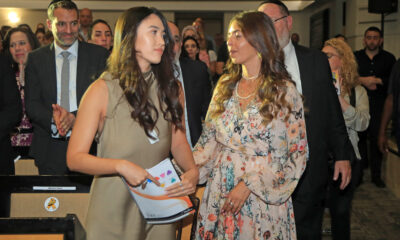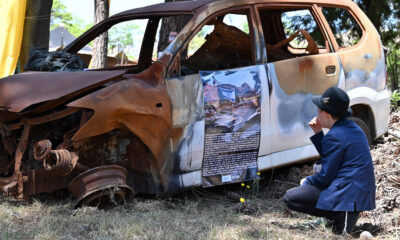
Israel

Slain hostage’s mother a symbol of fight and forgiveness
Yotam Haim’s mother, Iris, was excited to go and watch him perform on 7 October, but by the time he was meant to perform, he had already been taken by Hamas to Gaza.
Iris was prevented from making any contact with Yotam from the time he was captured until he was killed by friendly fire in mid-December. He had been taken hostage by Hamas terrorists from Kibbutz Kfar Aza along with more than 250 other innocent Israelis. On that same day, more than 1 200 Israelis were brutally murdered in southern Israel by terrorists who killed, raped, and burned people alive.
Since then, Iris, a palliative nurse, has become a public figure, going around the world spreading her story of forgiveness and strength in spite of her inordinate pain.
Her beloved son, Yotam, was born in 1995 to what she described as a “happy and musical family”.
“Yotam loved music. He had been drumming since he was three years old. My husband used to take him to the music room on the kibbutz and put him on the drums. That’s what he chose to do later, he wanted to become a professional drummer.
“He practised a lot, and joined a heavy metal band called Persephore.”
Yotam had been scheduled to perform with his band in Tel Aviv on 7 October at the PsychoWard Festival. “He invited all of us to watch him perform in Tel Aviv at 14:00. He had rehearsals on Friday evening and on the way home, he came past us. He gave me a big hug and said, ‘See you tomorrow at 14:00’. But as you know, 7 October started at 06:29,” said Iris.
“Yotam lived on Kibbutz Kfar Aza, which is very close to the Gaza fence. But when he said he was going to live there, we weren’t afraid,” she said. “We thought it was a good, nice place. Our perception was that everything was okay, everything was safe.”
Throughout the morning of 7 October, Yotam updated his family via messages and uploaded humorous videos to his Instagram story. Iris said Yotam’s use of humour was something she considered a strength.
However, at 10:30, Yotam messaged his family telling them that terrorists were shooting in his room and burning his house.
“I was seven minutes away from Yotam, but I couldn’t do anything. All the roads were blocked with terrorists shooting everybody who passed,” Iris said.
“The only thing we could do was tell him that everything would be okay, that the army and police were on the way.”
Yotam’s last message to his family came at 10:44, saying, “I’m afraid to go out, everything is burning.” Yotam was one of 17 Kfar Aza residents kidnapped by Hamas terrorists.
For three weeks after 7 October, Iris heard nothing from or about her son. “The automatic thought in this situation was that Yotam was dead. This wasn’t weird as every day, we heard about the bodies of friends and friends of our children being found,” Iris said.
“But I said, ‘No. We can choose to think in a positive way. Why do we need to believe that he’s dead if we don’t know it? What if he’s alive?’ It wasn’t easy.”
Soon after that, the Haim family got information from the Israel Defense Forces (IDF) explaining that Yotam’s phone had been located in Gaza at 12:00 on 7 October, and it had confirmation that he had been taken hostage.
After that, Iris, along with many other families of hostages, began making television appearances. “Most people who talked were angry about what happened in Israel, but I wasn’t angry. I spoke about Yotam, and told them that though I didn’t choose Bibi’s party, I put my trust in the government.
“I said that I believed we had the best army and intelligence, and that they would bring Yotam and everyone else home. And I started to say a lot of ‘thank yous’ – to those who helped us and especially the mothers of soldiers trying to find my son.”
Iris said people started to listen to her, and many media houses began to invite her to speak. “People began to hear my voice, which was full of hope and trust,” she said. “I didn’t realise it, but I was giving people power.”
Two days before Chanukah, on 5 December, the Haim family received encouraging information from an intelligence officer. A freed Thai hostage, Wichian Temthong, had shared a cell with Yotam in captivity and reported that he was still alive, that his spirits were high, and that in the cell he was drumming on the floor, singing, and sharing words of encouragement with those in the cell with him.
However, on 15 December, 70 days after Yotam was taken hostage, the Haim family was notified by the IDF that Yotam, Alon Shamriz, and Samer El-Talalka had escaped from Hamas captivity on 10 December. However, after five days of freedom, the three were tragically mistaken for terrorists and killed by IDF soldiers.
“After 36 hours of feeling broken, I understood that Yotam had the chance to free himself, and he took this chance,” Iris said. “He knew that he might not survive. Like the partisans of the Holocaust, he preferred to die a free person than stay alive in prison. And when I understood this, I was able to breathe and see the light again.
“While sitting shiva, the wife of one of the officers of the soldiers who shot Yotam, Alon, and Samer came to visit us,” said Iris. She told Iris that the morale in the army was extremely low because they had killed hostages they came to save, and the soldiers couldn’t continue to fight.
“I said to her, ‘What do you mean they can’t continue fighting? They must continue fighting, otherwise what will become of us? What will become of Israel? I want to talk to them’.”
Iris then recorded a message for the soldiers which said, “Hello, this is Iris Haim. I’m Yotam’s mother. I wanted to tell you that I love you very much and that I’m sending you my hugs from afar. I know that everything that happened isn’t your fault. It’s no-one’s fault except Hamas. May Hamas’s memory be erased from this earth.
“At the first opportunity, you are invited to come to our home. Anyone can come. We want to see you with our own eyes, to hug you, and tell you that you did what you had to do. As much as it hurts to say such a sad thing, it was the only thing you could do. It was probably right in that moment. And none of us are judging you. Not me, not my husband, Raviv, not my daughter, Noya, not Yotam, may his memory be blessed, not Toval, Yotam’s brother. We love you very much.”
These words of forgiveness inspired many, including the soldiers, and Iris became a symbol of forgiveness, unity, and hope in Israel.
Yotam’s funeral took place on 18 December 2023. On his gravestone, his family wrote that he was a sensitive soul and a brave heart. As a young adult, Yotam had struggled with mental-health issues, dealing with anxiety and depression.
Said Iris, “Yotam had 32 tattoos. One of them, a special one, was a tattoo of a dot and a comma. A dot means the end, and a comma means continuation. Yotam dealt with this question. He asked himself, dot or comma. He had this tattooed on himself as a reminder that he could continue even if life got very hard. That there was a way to continue.”
Said Iris, “I don’t have any tattoos on my body, and I don’t think I ever will. But I tattooed the dot and comma on my heart. We can use the dot when Yotam was killed. We can use the dot on 7 October. But I choose to use the comma, to continue to talk about Yotam’s legacy and what he believed in, to make the world a better place and unify society.
“To help people see others for their strengths, not their weaknesses,” she said. “The Jewish people will never use the dot, we need to use the comma, and continue.”
She and her family had made the decision to “talk about Yotam as a hero, as a person who fought for his freedom, not as someone who was killed by the army. He was a hero in life and death.”










